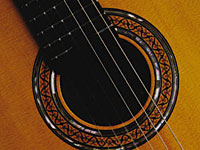Sonic Arts - MUSCG13458
Stream Summary
Faculty: ARTSC - Faculty of Arts&Social Science
School: School of the Arts and Media
Contact: sam@unsw.edu.au
Program: 3458 - Music / Advanced Science
Award(s):
Bachelor of Music (Major)
Information valid for students commencing 2013.
Students who commenced prior to 2013 should go to the Handbook's Previous Editions
Stream Outline
Sonic Arts focuses on the use of sound as a means for a broad-range of creative investigations and applications. Students gain foundational skills and knowledge in sound recording and processing, post production techniques, digital sound manipulation, acoustics, and psychoacoustics in preparation for advanced applications of sound in various media and genres, such as, film and video production, sound installations, sound art, and electronic-based composition.
Sonic Arts students share a common first and second year with students from other BMus streams and then complete their Stream over the third and fourth years of the program. Students are grounded in musicianship, performance skills, and music criticism in a wide variety of genres and styles, including Western art music, film, experimental, jazz, world and electronic-based musics. The specialisation is supported by a variety of large and small, Western and Non-Western Music ensembles. Technical and creative skills are developed through both assignment-based work and self-directed projects - from the creation of compact discs to soundtracks for visual media to sound installations - in a Professional Practice course, prescribed stream electives and free music electives. Under individual guidance, Directed Study encourages curiosity, initiative and life-long learning through the design and completion of a practice-led or community-based project. If admitted, at the fourth-year Honours level, students will be required to complete one of two options: 1. a Faculty-wide seminar, a practice- or creative-based project or research project, and a short Thesis, or 2. a Faculty-wide seminar, a course on music research method, and a Thesis.
In keeping with the diverse and interdisciplinary nature of Sonic Arts, students will have the opportunity to engage with Media Studies as well as other disciplines within the School of Arts and Media.
The Sonic Arts Stream is one of four streams within the Bachelor of Music (UNSW BMus) four-year, full time degree. Sonic Arts enables students to develop excellence in a comprehensive range of ensemble practices, theoretical and critical subjects, and music from various styles, genres and cultures.
Graduate Attributes
- The skills involved in scholarly enquiry, such as information literacy, critical analysis, and writing.
- An in-depth engagement with discipline-specific knowledge, such as instrumental or vocal performance, composition, score reading and writing skills, inner hearing, music theory, and repertoire knowledge.
- A capacity for interdisciplinary engagement through the study of music performance, composition, acoustics, and psychoacoustics.
- Capacity for analytical and critical thinking and for creative problem-solving through investigations on the use of sound in a broad-range of acoustic and aesthetic environments
- Information literacy - the skills to locate, evaluate and use relevant information.
- The capacity for enterprise, initiative and creativity, developed primarily through opportunities for performing and composing, and being involved in concert organizing and musical leadership.
- An appreciation of, and respect for, diversity through participation in and study of diverse musical practices and thinking.
- High levels of oral and written communication skills, supported with discipline-based forms of communication such as musical performance, scores and sound recordings.
- Skills required for collaboration and contribution to the international community are developed through individual instrumental or vocal performance, composition, ensemble performances and the study of diverse musical styles and practices.
- Respect for ethical practice and social responsibility are fostered through links with the music industry and music communities and discussions of professional practices in theory and practice alike.
- Identify and formulate solutions to problems of sound manipulation with intellectual and aesthetic independence.
Stream Structure
- MUSC1101 Music Reinvented (6 UOC)
- MUSC1602 Materials and Structures of Music 1 (6 UOC)
- MUSC1603 Materials and Structures of Music 2 (6 UOC)
- MUSC1604 Western Music: a Panorama (6 UOC)
- MUSC1701 Performance Lab 1 (6 UOC)
- MUSC1704 Performance Lab 2 (6 UOC)
- MUSC2116 Sound, Society & Self in World Music (6 UOC)
- MUSC2601 Advanced Studies in Music History and Culture 1 (6 UOC)
- MUSC2602 Materials and Structures of Music 3 (6 UOC)
- MUSC2603 Materials and Structures of Music 4 (6 UOC)
- MUSC2701 Performance Laboratory 3 (6 UOC)
- MUSC2702 Performance Laboratory 4 (6 UOC)
- MUSC3601 Advanced Studies in Music History and Culture 2 (6 UOC)
- MUSC3701 Performance Laboratory 5 (6 UOC)
- MUSC3702 Performance Laboratory 6 (6 UOC)
- MUSC3605 Synergies in Sound and Technology (6 UOC)
- Prescribed Stream elective (6 UOC)
- Prescribed music elective (6 UOC)
- MUSC4701 Performance Laboratory 7 (6 UOC)
- MUSC4702 Performance Laboratory 8 (6 UOC)
- MUSC4601 Directed Study (6 UOC)
- MUSC3101 Music Capstone (6 UOC)
- Prescribed music electives (12 UOC)
For practice focused candidates
- List A Faculty-wide seminar (6 UOC)
- Practice-based Project (composition portfolio, project or recital) 24 UOC
- Thesis (18 UOC)
For research focused candidates
- List A Faculty-wide seminar (6 UOC)
- Music research seminar (12 UOC)
- Thesis (30 UOC)









